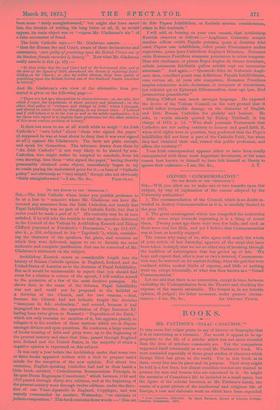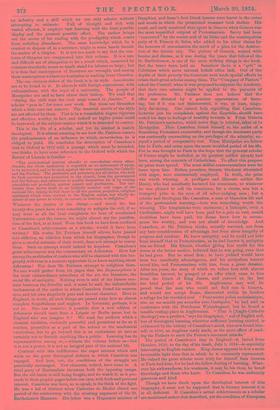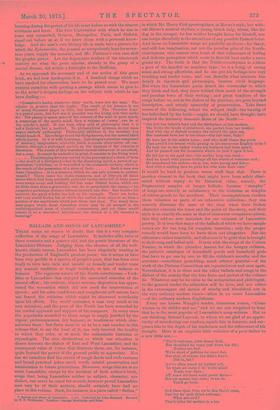BOOKS.
MR. PATTLSON'S "ISAAC CASAUBON.".
IT may seem but vulgar praise to say of history or biography that it is as interesting as a romance. Nor would it appear to be ap- propriate to the life of a scholar which Was not more eventful than the lives of scholars commonly are. Yet the comparison suggested itself continually as we read Mr. Pattison's book. We were reminded especially of those great studies of character which George Eliot has given to the world. For in this book, as in them, every line has its place and its purpose. Their story might be told in a few lines, but almost countless touches are wanted to present the men and women who are concerned in it. 'So might the narrative of Casaubon's life be included in a small space, but the figure of the scholar becomes, in Mr. Pattison's hands, the centre of a great picture of the intellectual and religious life of Europe, a vast and elaborate work on which have been expended • Isaac Casauboa, 1559-1015. By Mark Paulson, Rector of Lincoln College. London: Longman& 1875.
an industry and a skill which we can only admire without
attempting to estimate. Full of thought and rich with varied allusion, it employs vast learning with the least possible display and the greatest possible effect. The author brings out the stores of his reading with the prodigality which comes from unfailing abundance. The same knowledge which he is content to dispose of in a sentence, might in some hands furnish the matter of a chapter. It is not too much to say that the con- tents of libraries are compressed into this volume. It is a rare and difficult act of abnegation to let a result which, measured by common standards, seems so small, stand for labours so large ; but it is thus that masterpieces of literature are wrought, and among these masterpieces we have no hesitation in ranking Isaac Casaubon.
The one obvious defect of the book is in its style. Anacoloutha are to be found in it. It abounds with foreign expressions, with colloquialisms, with the argot of a university. The people of Montpelier are said to have chassi their bishop. We read that "during the civil wars the &de mage ceased to function." A scholar "goes in" for some new work. But the are blemishes which a little care can remove. The essential merits of the style are not affected by them. This is in a remarkable degree vigorous and effective, worthy, in fact, and indeed no higher praise could be bestowed, of the subject-matter which it is intended to convey.
This is the life el a scholar, and yet its interest is mainly theological. It is almost amusing to see how Mr. Eattison resents the predominance of an influence to which, nevertheless, he is obliged to yield. He concludes his description of - Casaubon's visit to Oxford in 1612 with a passage which must be intended, one thinks, to have some reference to the Oxford with which the Rector of Lincoln is familiar :—
"The ecclesiastical interest absorbs or overwhelms -every other. Outside, the whole institution is regarded as an instrument of party, to be supported, and to be used, against the two oppositions, the Catholic and the Puritan. The professors and governors are all clerics, who look for their provision and promotion in the church, from the government and the bishops, and endeavour to qualify themselves for it by writing pamphlets and preaching against popery and puritanism. The uni- versity thus shows itself as an intimate member and organ of the national life; taking its full share in all the passion, prejudice, religious sentiment which were current in the English nation, but wholly de- stitute of any power to vivify, to correct, to instruct, to enlighten.
Whatever the justice of the charge — and surely the last twenty-five years have done something to mitigate the evil, if we may trust at all the loud complaints we hear of secularised Universities—yet the reason, we might almost say the justifica- tion of the fact, is at hand. Were this book to have been confined to Casaubon's achievements as a scholar, would it have been written? His works, Mr. Pattison himself allows, have passed into oblivion, an oblivion from which his biographer, though he gives a careful estimate of their worth, does not attempt to rescue them. Such an attempt would indeed be hopeless. Casaubon's great achievement was the commentary on Athenmus. How few among the multitudes of readers who will be charmed with this bio- graphy, will even in a measure appreciate it, or know anything about Athentens ! Nor does Mr. Pattison attempt to enlighten them. No one would gather from his pages that the Deipwsophistm is the most extraordinary miscellany of the art, the literature, the social life of antiquity. Nothing even is said of the bizarre con- trast between the frivolity and, it must be said, the indescribable uncleanness of the author in whom Casaubon found his magnum opus, and his own singularly pure and devout character. Here in England, in truth, all such things are passed away into an almost complete forgetfulness and neglect. In Germany, perhaps, it is not so. One can conceive it possible that a new edition of Athenmas should issue from a Leipsie or Berlin press, but in England who can imagine it? We read the authors which a classical tradition, curiously powerful and persistent as far as it reaches, prescribes as a part of the school or the academical curriculum, but to go beyond this is an enthusiasm so rare as certainly not to furnish anything like a public. Learning has its representatives among us,—witness the volume before us—but it is not a power, it is not an integral part of the national life.
Contrast with this indifference the eager interest which still waits on the great theological debates in which Casaubon was engaged. And here, too, the conditions of the struggle are practically unchanged. New elements, indeed, have come in. A third party of Rationalists threatens both the opposing camps. But the old battle is still being fought, and we watch it, as it pro- ceeds in these graphic pages before our eyes, with fresh and personal interest. Casaubon was born, so to speak, in the thick of the fight. He was a lad of thirteen when Catherine de Medici closed one period of the controversy with the crushing argument of the St. Bartholomew Massacre. His father was a Huguenot minister of
Dauphine, and Isaac's first Greek lessons were learnt in the caves and woods in which the persecuted remnant took shelter. His youth and early manhood were spent in Geneva when Geneva was the most imperilled outpost of Protestantism. Savoy had been "converted" by the recent zeal of its Duke and the unscrupulous piety of S. Francis de Sales, who added to his other claims for the honours of canonisation the merit of a plan for the destruc- tion of the heretic city. The picture of Geneva, wasted witlr famine and disease, as it was during the years that followed the: St. Bartholomew, is one of the most striking things in the book. But the brave town held on. Somehow there is a "grit" is Calvinism which more rational beliefs often lack. Out of the- depths of their poverty the Genevese even made special efforts to retain their great scholar among them. The "Company of Pastors" asked the Council, when it was proposed to suppress the Academy, that their own • salaries might be applied to the Payment of the professors. Mr. Pattison does not believe that the offer was dictated by a genuine appreciation of learn- ing, but if it was not disinterested, it was, at least, singu- larly far-seeing. One cannot help regretting that Casaubon, however just his complaints against the Republic, should hare ended his days in feelings of hostility towards it. Front Geneva Mr. Pattison's narrative, which never flags in interest, takaleutt to Montpelier. Here Casaubon found himself in the Inidaklef s flourishing Protestant community, and though the dominantparty was continually encroaching on the privileges of the minority, en- joyed a period of comparative rest From A,Iorttpelier we follow, him to Paris, and enter upon the most troubled period of his life. For he was brought to Paris in the hope that the greatest scholar of France might be included, as its greatest soldier already had. been, among the converts of Catholicism. To effect this purpose no pains were spared. The most skilful controversialists were let loose upon him. Bribes, promises, threats, kindness alternated' with anger, were continuously employed. in truth, the prize was worth winning. A profligate and illiterate soldier like Henry, who had manifestly bartered his conscience, or whatever he was pleased to call his conscience, for a crown, was but a. trumpery prize in the eyes of all sober-judging men ; but a. scholar and theologian like Casaubon, a man of blameless life and of the profoundest learning,—here was something worth the winning. The temptations were enormous, a bishopric, even a Cardinalate, might well have been paid for a gain so -vast, would doubtless have been paid, for Rome knew how to recom- pense the worthy, and was not afraid of knowledge. And. Casaubon, so Mr. Pattison thinks, actually wavered, not from any base consideration of advantage, but from sheer integrity of" purpose and candour. He knew antiquity, and he could not bide from himself that to Protestantism, as he had known it, antiquity was no friend. His friends, whether giving him credit for the worse or the better motive, believed that he was going, even that he had gone. But he stood firm ; to have yielded would have been too manifestly advantageous, and his scrupulous honour saved him, and Protestantism with him, from a great disaster. After ten years, the story of which we follow here with almost breathless interest, he grasped at an offer which came to hirrr from the Court of King James, and entered on the last too brief period of his life. Anglicanism may well be proud that the man who could not find rest in Geneva, and would not accept Rome, discovered within its bordera- a refuge for his troubled soul "Pour nostre police ec.clesiastique„ env ne me semble pas accorder avec rantiquite," he had said in conference with the Dutchman Wytenbogaert, but he found &- tenable resting-place in Anglicanism. "That it [Anglo-Catholie- theology] was a product," says his biographer," not of English soil, but of theological learning, wherever sufficient learning existed, is evidenced by the history of Casaubon's mind, who now found him- self, in 1610, an Anglican ready made, as the mere effect of read- ing the Fathers to meet Du Perron's incessant attacks."
The period of Casaubon's stay in England—it lasted from- October, 1610, to the day of his death, July 1, 1614—is especially. interesting to-Rnalish readers. King James appears in it in a more favourable light than that in which he is commonly represented: He valued the great scholar more truly for himself than Geneva; or Paris had done, for he had the fellow-feeling of learning. What- ever his awkwardness, his weakness, it may be his vices, he loved) khowledge and those who knew. To Casaubon he was uniformly generous and kind.
Though we have dwelt upon the theological interest of this biography, it must not be supposed that in literary interest it is at all deficient. If Casaubon's actual achievements as a scholar- are mentioned rather that described, yet the condition of European
learning during the period of his life is set before us with the utmost vividness and force. The four Universities with which lie was in some way connected, Geneva, Montpelier, Paris, and Oxford, stand out before us as if we knew them with a personal know- ledge. And the man's own literary life is made into a picture for which the Ephemerides, the journal so se,rnpulously kept for seven- teen years, supply the material, and Mr. Pattison's own rare skill the graphic power. Let the degenerate student of the nineteenth century ,see what the great, scholar, already in the grasp of a mortal disease, did within a fortnight at the Bodleian.
As we approach the necessary end of our notice of this great book, we feel how inadequate it is. A hundred things which we have marked for observation have to be passed over. We must content ourselves with quoting a. passage which seems to give to us the writer's deepest feelings on the subject with which he has been dealing :— • • " Casaubon's books, whatever their worth, wore, not the man. The scholar is. greater than his .hooks. The result of his labours is not so many thousand pages in folio, but himself. The 'Paradise Lost' is a grand poem, but how much grander was the living soul that spoke -itl' Yirrpoetey lanai& more,of the.essence of the soul, is more nearly trapseriptrre the poet's niMd; than a. :volume :of -4 notes ' can -be of the scholar's mind. It has been often said of philosophy that it is CnoWlIlloctrine, but a method. No philosophical sYstetne, as put upon. opiper;',eliihody philosophy. Philosophy perishes in the moment you -.Twaulda teach it. Knowledge is not-the thing-known, bat the mental habit whidi knows. So it is with Learning. Learning la &peculiar eempound of Memory, imagination, scientific habit, accurate observation, all con- iracted, through a prolonged period, on the analysis of the remains of .1/tem:tutu. The resultof this -eustained mental endeavour is notebook,
Itcannot be embodied in print, it consists in the living word.
b..,.T.pie,learning does not consist in the possession of a stock of facts
Merit of a .dictionary—but in the discerning spirit; a power of ap- preCiation, 'Itidicium,' as it was called in the sixteenth century, which is the result of the possession of a store of facts. . . . . . Such a man was Isaac Casaubon. It is a, treasure which we can only possess in earthen vessels ? There came the death-snminons, and at fifty-six all those Stores which had been painfully gathered by the daily toil of forty years
• -were swept away, and nothing left but some lifeless books, which' can .do little more than a.gravestone can do, to perpetuate the name,—' tot congestos noctesque diesque labores hauserit nna dies.' But besides his memory, the great scholar has left us his example. There are books, and very useful books, but Of which the author is no more to us, than a portion of the machinery which put them into type. The many thou- sand pages which Isaac Casaubon wrote may be all merged in the undistinguished mass of classical commentary, and yet there would remain to us a cherished inheritance, the record of a life devoted to learning."




































 Previous page
Previous page